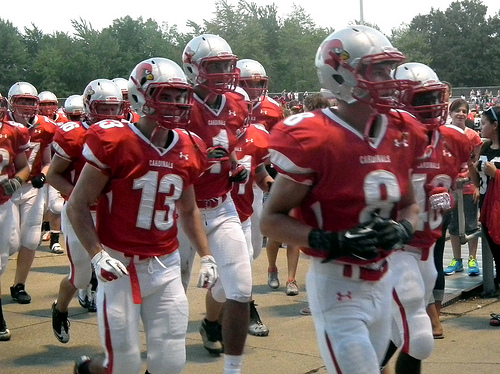If written directions alone would suffice, libraries wouldn’t need to have the rest of the universities attached. – Judith Martin

Can you imagine the chaos that would ensue if a football team, having only ever read books about plays and the rules, took the field and tried to play a game? What they need practical experience, feedback, and a mentor or a coach.
What does that mean?
Despite all the hype and celebration of the internet as a method to learn, reading alone isn’t a very useful way to learn about a topic. The same goes for an education consisting solely of book learning. Would you want a doctor who had only read about surgery, or one who had attended classes at a university? I know which one I’d chose!
Reading alone leaves plenty of room for misunderstanding to occur, to grow, to take root, and to warp a person’s ideas about how things work. With a university (or any other kind of teaching environment, including online), a teacher or a test can show flaws and weaknesses in a student’s learning.
In this manner, difficulties can be spotted early in the learning curve and corrected. Libraries are a great resource, and one can learn quite a bit by visiting and making use of the knowledge and wisdom contained therein. Just be sure you have a knowledgeable person with whom you can test your understanding of the material.
Why is feedback important?
Feedback the name of a method of looking at results, and judging how close to the mark you managed to get. The trick is if you have only “book learning” and no practical experience. That is the difference between a strictly book based learning, and learning with feedback.
There are lots of real-world factors that are ignored in many books. This isn’t usually done as deliberate malice, but as a way of keeping the concept simple, and the math clean. However, the results can be wildly incorrect results that the reader assumes is correct.
That can lead to real problems later on. When there is someone there who knows what the result should actually have been, and can explain the issues with the reader, true understanding can begin. Misconceptions can be dispelled, and learning can then continue.
Where can I apply this in my life?
When I was a young teenage know-it-all, I had misread a term in a book, and proceeded to have an argument with my dad over the term and it’s proper use. Eventually he gave up, as I was obviously an idiot, but I was also dead wrong.
He knew the term and had used it, but I was refusing his feedback. That would have been a really good time to use feedback, but (as a teenage boy is wont to do) I wasn’t going to listen to my dad. After all, what did he know!
In a more practical context, consider an average physics book, where problems are formulated and solved with friction ignored, or wind resistance ignored. If you were trying to figure out how far a home-made go-cart would roll when pushed from the top of a small hill, there are two answers.
The first answer is from the physics book, which ignores the frictions of the tires on the ground as well as the friction at the axles. It also ignores the wind, and how it can affect the distance covered. If you have ever heard of “head-winds” or “tail-winds” you know what I mean.
The second answer is the real life result, where you get a much shorter distance actually measured. If you didn’t know which form of friction resulted in how much loss, your final ‘understanding’ of the problem would likely include a ‘fudge factor’ with all of these factors lumped into a simple constant.
How poorly would that math model you just constructed work if you tried to figure out how fast a real car would be going if it rolled down from a high mountain pass? Do you think you’d be anywhere close to the correct answer? I doubt I would.
Now consider how different your result would be if someone had been able to explain all the different factors that resulted in your actual measured distance that were ignored by the book. While you’d need additional information, you’d probably get a lot closer than you would have without the feedback.
If you’ve been reading some of my previous blog posts, you’ll note that I keep asking if you can find a mentor or someone who already has some skill or knowledge in the subject you seek. They can provide what no book can provide: feedback.
Online resources are useful, but without testing and explaining, it’s hard to truly be sure you grasp the subject. A mentor or teacher can be a real help in this respect. That doesn’t mean libraries are useless, far from it. But book learning alone is no substitute for actual experience, either yours or that of a mentor or teacher.
From: Twitter, @JustJivanta
confirmed at : http://www.brainyquote.com/quotes/quotes/j/judithmart406298.html
Photo by Erik Daniel Drost
Happy Birthday to Judith Martin (aka Miss Manners), born 13 September, 1938.






